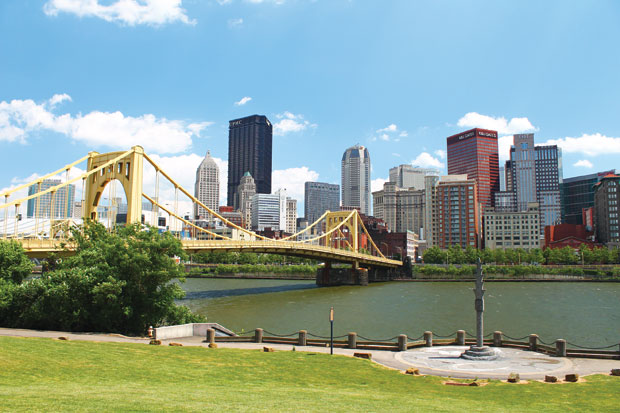It gets better for the ‘Queer as Folk’ city with a vibrant cultural and gay life

OVER THE RIVER | Downtown Pittsburgh, viewed from across the Allegheny River, is more than just the setting for ‘Queer as Folk.’ (Photo by Andrew Collins)
ANDREW COLLINS | Contributing Writer
outoftown@qsyndicate.com
Once one of the country’s pre-eminent industrial powerhouses, with a population of nearly 700,000, Pittsburgh (visitpittsburgh.com) has, like many similar American cities, changed considerably over the past few decades. Although now less than half its size compared to its heyday, this hilly and historic metropolis in the Ohio Valley is enjoying a dramatic renaissance, with a number of formerly downcast neighborhoods now abuzz with hip restaurants, indie shops and rehabbed factory buildings, apartments and row houses.
Having received a bump in gay visibility during the years it served as the setting of TV’s Queer as Folk (which was actually filmed in Toronto), Pittsburgh has also steadily developed into a very popular weekend destination among LGBT travelers.
Gays and the arts
The gay community is well-integrated within the mainstream population. The city has numerous theaters with artsy and gay-themed films and a high appreciation of alternative culture (consider that two of its top attractions are the Mattress Factory contemporary art museum and the Andy Warhol Museum). The city also hosts the Pittsburgh International Lesbian & Gay Film Festival each October, and the fast-growing Pride Theater Festival took place over two weekends just this month.
It’s architecturally notable, too: You can’t miss the city’s most remarked-upon skyscraper, PPG Place, a neo-Gothic monolith designed by the late gay architect Philip Johnson. Nearby, Liberty and Penn avenues form the spines of a 14-block Cultural District of theaters and performance halls housing the Pittsburgh Symphony Orchestra, the Pittsburgh Ballet and the Pittsburgh Opera. You’ll also find numerous theaters, including the gay-popular Cabaret at Theater Square.
Pittsburgh’s North Side lies just across the Allegheny River from downtown and is home to the city’s relatively new sports stadiums as well as the Andy Warhol Museum, which celebrates the life of the late pop art icon, who grew up in nearby Oakland. The museum contains more than 8,000 works and is an outstanding, engaging and often very funny space, laid out with abundant commentary on Warhol’s life.
South of downtown, the city rises sharply above the Monongahela River toward Mt. Washington, a workaday neighborhood with spectacular views of downtown. Ride up the slope via the Monongahela Incline, which leads to a viewing platform and a small museum. A short drive east is the bohemian South Side, a repository of funky shops, galleries and eateries that once anchored Pittsburgh’s Lithuanian and Polish communities.
East of downtown, Oakland was built from the gobs of money generated during Pittsburgh’s industrial heyday and today contains hospitals, universities and high-tech firms. More east still is Shadyside, a gentrified patch of neatly kept yards and attractive old homes, many of them gay-owned. Ellsworth Avenue has several gay-popular eateries and businesses, and more chichi Walnut Street holds mid- to high-end chain stores.
Pittsburgh’s dining scene has blossomed, especially in some of the hip, outlying neighborhoods like Lawrenceville, East Liberty and Bloomfield. Along Butler
Avenue in Lawrenceville, you’ll find all sorts of cool eateries: Coca Café (CocaCafe.net), which also has a branch in the Mattress Factory Museum, serves modern American fare and is a great pick for brunch; Cure (CurePittsburgh.com) is known for innovative, meaty fare, including pig’s cheek ragout and ox-tail ravioli; and Tamari (Tamaripgh.com) is a gorgeous space acclaimed for artful Asian-Latin fusion fare, such as tamales with chicken, Chinese sausage and green curry. In Garfield (near East Liberty), Salt of the Earth (Saltpgh.com) serves fine renditions of farm-to-table cuisine.
In the Strip District, lesbian-owned Pamela’s Diner, aka P&G’s (Pamelasdiner.com) is a fine spot for hearty breakfast fare and delicious sandwiches at lunch.
There are other branches in Squirrel Hill, Shadyside and Mt. Lebanon. And the original Primanti Bros. (PrimantiBros.com) has been doling out huge sandwiches, topped ridiculously but deliciously with French fries and cole slaw, since 1933.
The elegant Eleven Contemporary Kitchen (ElevenCK.com), which is well-suited to special-occasion meals, is part of the gay-friendly Big Burrito (BigBurrito.com) group, which operates several slick, lounge-y restaurants around town, including the fun Pan-Asian restaurant Soba and the colorful and lively Cal-Mex restaurant Mad Mex. For a terrific meal near downtown’s gay bars, check out Meat & Potatoes (MeatAndPotatoespgh.com), a lively gastropub serving sophisticated yet accessible burgers, sweetbread tacos, bone marrow with grilled bread and other carnivore-driven delights.
As QAF fans know, the 900 block of Liberty Avenue downtown has a few the city’s top gay nightlife options, including neighborhood-y There Ultra Lounge; the popular and long-running Images video bar, and 941 Saloon, which has an after-hours upstairs section that pulses into the late-night hours.
Relatively new Cruze Bar (CruzeBar.com) in the Strip is a popular dance club in an attractive space — it’s arguably the snazziest gay bar in the city. Low-keyed Real Luck Café (RealLuckCafe.com) is nearby, draws a mix of men and women, and serves pub food and drinks. A few blocks away is the popular gay bathhouse, Club Pittsburgh (ClubPittsburgh.com). On nearby Polish Hill, Donny’s Place is a country-western dance bar with a pool hall drawing a mixed-gender crowd. Downstairs is a guy-oriented basement nook known as Leather Central.
Shadyside’s quintessentially queer video lounge and cafe, 5801 Ellsworth (5801videolounge.com) is a hip but friendly place for cocktails, good home-style cooking and great conversation, and nearby Spin draws a similar, mostly gay mix of scenesters, young professionals and fairly collegiate sorts. In increasingly trendy Lawrenceville, the Blue Moon is a fun and welcoming spot with fun videos on TV, karaoke, and an easygoing crowd, and Cattivo (Cattivo.biz) — especially popular with lesbians but friendly to all — stands out as a great place both to drink and eat (expect pizza, hoagies, strombolis and the like).
This article appeared in the Dallas Voice print edition June 28, 2013.

